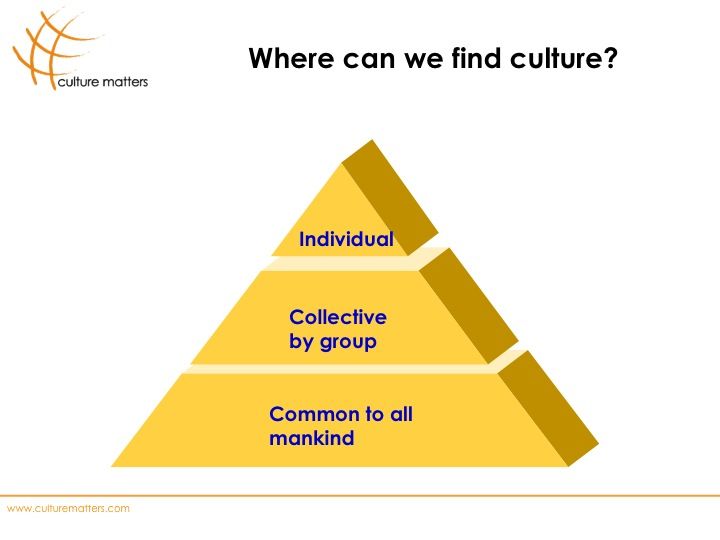During our Cultural Awareness Training, we focus on Where Culture Is.
In other words, can we isolate culture and distinguish it from Personality and what is Common to All ManKind?
The answer is yes.
Culture has a place amongst the other two (Personality and What is Common to All ManKind). To make it a bit clearer, let’s put it in a picture (see below):
 The Individual
The Individual
At the very top, you see the Individual.
First and foremost, people from all cultures should be acknowledged for their personalities. Not for their cultural background or “Cultural Programming“. The Individual has his or her personality first and second this same person has a culture of his or her own.
Common to all Mankind
This one is at the very bottom of the picture. There are things we all do. Irrespective of our cultural background. Examples are eating, drinking, sleeping, etc. These are pretty much identical to Maslow’s hierarchy of needs. But there are plenty more: we all engage in relationships, be it friendly or more intimate; we all aspire to a purpose in life; we all have some sort of favorite time-pass (movies, music, or whatever). However, how we practice all of the above depends greatly on our cultural background.
The same holds true for Organizations. All organizations (worldwide) have the following 4 things in common:
- Hierarchy or Leadership (or none hierarchy)
- Structures and procedures
- Objectives or Goals
- Resources (like “stuff” and or money)
But how do these four points pan out in different countries, depending on the country, and hence on the culture?
All these above-mentioned Generalities get their specifics in the middle layer, the collectivity by the group (not to be confused with Collectivism!) called Culture.
Example
A typical example is food and eating. Take the Dutch. What is a typical Dutch lunch? The general answer to this question is: “A cheese sandwich and a glass of Milk“. Now take the French. What does a typical business lunch look like in Paris? The typical answer is: “It takes at least 1 1/2 hours; has a three-course meal; and there are two bottles of wine, one red and one white“.
Is this always the case in Paris? No, of course not. The same holds true for the Dutch. But we’re describing general trends in society here.
First Level
On the surface, it is quite easy to see what the differences are, and most Dutch and French will confirm that the above-mentioned examples describe the average (daily) situation. But there is more…
Second Level
If you ask the Dutch “Why” they eat this simple sandwich lunch (don’t forget the Milk!), the general answer is that it is Efficient and quick. Even almost biological: if you don’t eat, you’ll get hungry. So better eat. Even if it is something simple.
If you ask the French “Why” they indulge (?) in long lunches with wine and a hot meal, the answer is that it is a moment to relax, and build relationships. But also to do the actual business to be conducted.
Conclusion
We can see in this example that there are two levels of Cultural Differences. One at the observable, visible level, but, maybe more critical, at a deeper, motivational level too.
Not only do we eat different things in different cultures, but also the deeper motivation for why we eat differently is culturally driven.
An article about culture and personality can be found here.
Read this article to get a good definition of what culture is.
What are your examples? Please share them by describing them here below.
Get a Taste of How Chris Presents, Watch his TEDx Talk
 Call Direct: +32476524957
Call Direct: +32476524957
 European Office (Paris) Whatsapp: +32476524957
European Office (Paris) Whatsapp: +32476524957
The Americas (USA; Atlanta, GA; también en Español): +1 678 301 8369
Book Chris Smit as a Speaker
If you're looking for an Engaging, Exciting, and Interactive speaker on the subject of Intercultural Management & Awareness you came to the right place.
Chris has spoken at hundreds of events and to thousands of people on the subject of Cultural Diversity & Cultural Competence.
This is What Others Say About Chris:
- “Very Interactive and Engaging”
- “In little time he knew how to get the audience inspired and connected to his story”
- “His ability to make large groups of participants quickly and adequately aware of the huge impact of cultural differences is excellent”
- “Chris is a dedicated and inspirational professional”
In addition, his presentations can cover specific topics cultural topics, or generally on Cultural differences.
Presentations can vary anywhere from 20 minutes to 2 hours and are given World Wide.
Book Chris now by simply sending an email. Click here to do so.
Read more about what Chris can do for you.
- Percentage of People Rating a Presentation as Excellent 86%
- Rating the Presentation as Practical 89%
- Applicability of Chris' presentation 90%
About Peter van der Lende

Peter has joined forces with Culture Matters.
Because he has years and years of international business development experience joining forces therefore only seemed logical.
Being born and raised in the Netherlands, he has lived in more than 9 countries of which most were in Latin America.
He currently lives in Atlanta, Georgia (USA) with his family.
You can find out more at https://expand360.com/
Or find out what Peter can do for you here.
- 178 Toby Mildon - 8 May 2024
- 177 Mark Steinberg - 22 February 2024
- Japanese versus Western Culture - 24 January 2024


Interesting article. I believe there is a difference to be drawn between private culture and public culture, or one’s own culture VS the culture (or the bits of culture, to better put it) one shows to his/her peers. My understanding is that one may very well choose to show a culture which is NOT his own. For example, if I am working in England and are of Italian origins, I might want to hide tids and bits of Mediterranean culture, as this may be used against me by close-minded yet powerful peers. The same could be true for Belgians working in France, where “conservative” French managers are more inclined to consider them not to par with their French counterparts.
Maybe your two levels of culture describe in fact the private (acquired and hard to run away from) VS public bits – the latter being the ones one chooses to show?
Second, I do agree with you about the fact taht culture can be differentiated from one’s personal identity. Still, I think there is something to be said about your own understanding of culture. I mean, WHAT is it, rather than where? Since I moved away from my native country, I started understanding key aspects of my native culture that I would not have caught otherwise. So two levels of culture seem to be a bit too “simple” to describe what one recognizes as integral part of his own personal identity..
Thank you. You have my mail if you want to get in touch w me!
Hi Franco,
Thank you for your comment. I understand where you’re coming from.
It’s a comment I get a lot when doing a workshop.
If I understand you correctly (and re-phrased) into my own words), You talk about Private culture and public culture.
To my understanding Public culture is more behavior related (conscious behavior). In other words, you are aware of your behavior and adapt this given certain circumstances.
Often when we come under (emotional) pressure, we very often revert to our “default” behavior, which is your Private culture.
The fact that you/one can adapt to an other culture is somewhat described in an earlier post I’ve written. You can find it here: https://culturematters.com/cultural-awareness-training-a-definition/
The place of culture in the middle I agree. But in my opinion and as a counselor, coach and consultant I wouldn’t necessarily put those elements in a triangle…I’d prefer three balls or circles tangent each other. I mean, all those issues are mostly present while facing people where ever they are from.
Hi Aila,
Thanks for your comments. Have you read my latest post?
Wonder what you think of that: https://culturematters.com/does-cultural-diversity-make-you-smile-or-cry/
INDEED CULTURE IS THE WAY OF LIFE AND HOW PEOPLE BEHAVE WITHIN A SPECIFIED TIME BECAUSE CULTURE IS NEVER STATICS BUT DYNAMIC, AM PRETTY SURE ABOUT THAT. BUT CONSIDERING PRIVATE AND COUNTRIES I COULD SAY BASED ON COLLECTIVE AS YOU MAY PUT IT AFRICA HAVE CULTURE AND EUROPE DON’T…… I WILL COMMENT ON IT LATER
Hi Seidu,
You’re quite right! And thanks for your comment!